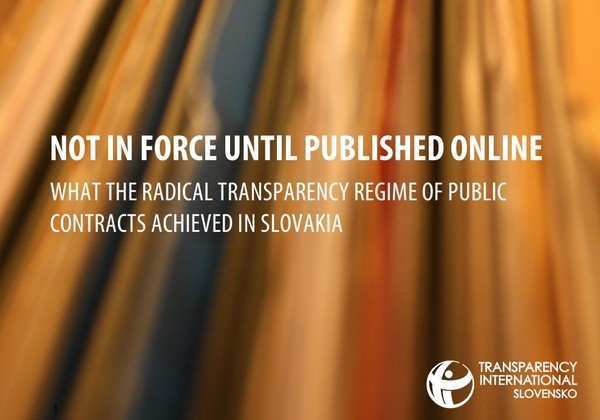Slovak Contract Register—50,000 unique hits per month
Analysis by Transparency International SK dispels many objections to the register of public contracts.

While the Czech bill on public contract register sits in the Chamber of Deputies for 35 months now, similar legislation has been enforced in Slovakia for almost four years. Let’s see how it works.
Will the disclosure of public contracts lessen interest in state procurement orders?
The very opposite is true. The number of single-bidder tenders in Slovakia dropped by half in the monitored period and overall the average count of bidders more than redoubled in the period from 2011 to 2014. The odds are that firms competing for public contracts obviously do not shy away from going public.
Will the register be perhaps too costly?
The costs of introducing the contract register, its updates and administration in the first four years cost Slovakia the equivalent of CZK 667,000. Annual maintenance costs for the coming years are estimated to be CZK 81,000 p.a.
It should be noted that a similar Czech register is actually available on the public administration website https://portal.gov.cz/portal/rejstriky/data/10013/.
Will the disclosure burden municipal budgets?
Some of the biggest fears are related to the very fact of publishing the contracts and related administrative expenses. Some mayors are wrongly apprehensive of the scanning of public transport tickets (the bill, in fact, does not require any such scanning and tickets in general are not subject to publication).
The low costs of disclosing the contents of public contracts are evidenced by the growing number of Czech mayors who publish them although this is not immediately sanctioned by the law, and fully corroborated by the Slovak experience.
According to the Slovak analysis, “the disclosure costs are negligible”. It shows that red tape was reduced in some administrative cases, because contracts were often subject to requests for information in accordance with the Slovak equivalent of Czech Act 106/1999 Coll. on Free Access to Information.
Peter Štetka, lawyer for the Slovak City of Pezinok, notes in his analysis that it is easier to disclose all contracts than to ruminate which of them should be disclosed, and which should not. He asserts that the clerical performance is positively influenced by the prospect of somebody actually seeing the contracts.
Will the contract register actually interest anyone?
The analysis has a convincing answer to the oft-repeated question: 54,000 unique website hits a month. Eleven percent of adult Slovaks (480,000) have viewed the register on at least one occasion and eight percent of them view it once or oftener each year. Furthermore, the register audience is growing every year.
It follows from conversations with Slovak investigative journalists that they consider the register of public contracts a key instrument which many of them use on daily basis. It allows shortening the investigation of many causes by months.
Will the register produce the desired effect?
The journalists approached by the authors of the study believe that the register reduces the squander of state funds precisely because the contracts are public. However, they are convinced that there still is room for improvement.
Even though it would be imprudent to give all the credit only to the register of contracts (Slovakia at the same time passed more bills designed to achieve a greater transparency), it nevertheless goes to show that Slovakia climbed 12 rungs on the TI anti-corruption ladder and scored more improvement than many other states, in that period.
Recommendations to other states
It seems that while apocalyptic visions are not being fulfilled, the positive impact is measurable and quite appreciable in a short span of time. In conclusion the study offers recommendations stemming from Slovakia’s experience and targeting other countries which would like to introduce the register of contracts; some of them are certainly worth mentioning:
- Non-applicability sanction is of key importance
Any other control mechanism would be demanding, costly and inefficient. The ideal solution is to set the rules so both parties want to disclose the contract = non-applicability sanction. - Make contracts simply accessible from one point and machine-readable
Easy retrieval, comparison and filtering of contracts is of key importance for the applicability of the law. - Comparison must be easy
The possibility to compare various contracts for one and the same service/commodity may be of crucial importance to mayors and administrators. They will find it easier to assess the value of the offer put on their table.
Full text of the analysis in English is available at: https://rekonstrukcestatu.cz/na-stazeni/open-contracts.pdf.
